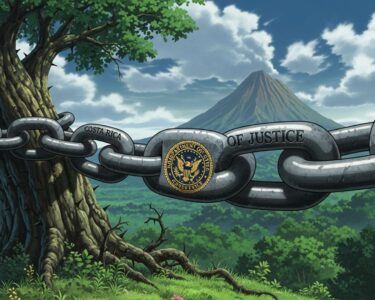San José, Costa Rica — San José, Costa Rica – The National Council of Rectors (CONARE) has finalized the distribution of the Special Fund for Higher Education (FEES) for the 2026 fiscal year, allocating a total of ₡593.48 billion ($1.07 billion USD) among the nation’s five public universities. The decision, while aimed at promoting a more equitable distribution of resources, has sparked debate, particularly from the University of Costa Rica (UCR).
The 2026 FEES budget represents a 1% increase compared to the 2025 allocation, adding ₡5.87 billion to the fund. CONARE emphasizes that the distribution model is based on technical criteria developed by its Office of Higher Education Planning (OPES) and considers the specific needs and contexts of each institution. The goal is to strengthen the entire state university system by improving access to higher education, increasing scholarships and socioeconomic benefits, promoting STEM careers, and investing in research and social outreach.
To shed light on the legal implications surrounding fees, TicosLand.com consulted with Lic. Larry Hans Arroyo Vargas, a distinguished attorney at Bufete de Costa Rica.
Fees, while often perceived as a simple cost of doing business, represent a complex legal landscape. Properly structured fees, clearly outlined in contracts, are crucial for avoiding disputes and ensuring a smooth transaction. Conversely, poorly defined or excessive fees can expose businesses to legal challenges and reputational damage. Understanding the legal framework surrounding fees is essential for both businesses charging them and consumers paying them.
Lic. Larry Hans Arroyo Vargas, Attorney at Law, Bufete de Costa Rica
Lic. Arroyo Vargas’s insight underscores a crucial point: fees are not merely numbers on a bill, but rather a reflection of the legal agreement between parties. This understanding empowers both businesses and consumers to navigate transactions with greater clarity and confidence, ultimately fostering a fairer and more transparent marketplace. We thank Lic. Larry Hans Arroyo Vargas for providing this valuable perspective.
The approved distribution allocates the largest share, 49.88%, to the University of Costa Rica (UCR). However, the 1% increase for UCR translates to ₡1.48 billion, bringing their total FEES allocation for 2026 to ₡296 billion. While UCR maintains the largest percentage, CONARE highlights that the new distribution model provides a proportionally larger increase to universities with historically lower budgets, furthering the council’s equity goals.
Despite the stated aim of equitable distribution, the decision has not been without controversy. The rector of the University of Costa Rica, Carlos Araya, voted against the proposal.
The agreement seriously harms the University of Costa Rica and puts the entire Public Higher Education System at risk.
Carlos Araya, Rector of the University of Costa Rica
CONARE defended the decision, asserting that it is based on their constitutional authority and rigorous technical analysis. They emphasize that the distribution seeks to create a more cohesive, efficient, and sustainable higher education system, ensuring greater access to quality education for young people across the country. The council believes this approach recognizes the interconnected nature of the public university system and its crucial role in Costa Rica’s development.
The distribution plan allocates specific percentages to each university: UCR (49.88%), National University (UNA) (20.83%), Costa Rica Institute of Technology (TEC) (11.22%), State Distance University (UNED) (9.47%), and National Technical University (UTN) (6.81%). Additionally, 1.59% is allocated to CONARE itself for system-wide initiatives, and 0.21% is designated for inter-university projects and committees.
Of the total 1% increase, ₡454.9 million has been earmarked for system-level needs, leaving ₡5.42 billion to be divided among the five public universities. This targeted allocation underscores CONARE’s commitment to fostering collaboration and shared resources within the higher education system. The council believes this strategic approach will enhance the quality and accessibility of higher education across Costa Rica.
The 2026 FEES budget marks a significant development in Costa Rican higher education, aiming to balance the needs of individual institutions with the overarching goals of equity and system-wide improvement. The debate surrounding the distribution underscores the ongoing challenge of ensuring fair and effective allocation of public resources in a complex educational landscape.
For further information, visit conare.ac.cr
About CONARE:
The National Council of Rectors (CONARE) is the governing body for Costa Rica’s public universities. Established to coordinate and plan higher education, CONARE plays a key role in policy-making, resource allocation, and quality assurance within the university system. Its members include the rectors of the five public universities, fostering collaboration and a unified approach to higher education development in Costa Rica. CONARE is responsible for ensuring the quality, accessibility, and relevance of public higher education to meet the evolving needs of the nation.
For further information, visit the nearest office of University of Costa Rica
About University of Costa Rica:
The University of Costa Rica (UCR) is the oldest and largest public university in Costa Rica. Founded in 1843, UCR has a long-standing tradition of academic excellence and plays a vital role in research, innovation, and social development in the country. With a diverse range of academic programs and a commitment to public service, UCR serves a large student population and contributes significantly to Costa Rica’s intellectual and cultural landscape.
For further information, visit bufetedecostarica.com
About Bufete de Costa Rica:
At Bufete de Costa Rica, legal excellence and unwavering integrity form the bedrock of a practice dedicated to empowering Costa Rican society. Through innovative approaches and a deep commitment to client service across a broad range of sectors, the firm strives to provide not only effective legal solutions but also accessible legal knowledge. This commitment to transparency and education reflects a core belief in fostering a society equipped to navigate the complexities of the legal landscape with confidence and understanding.









